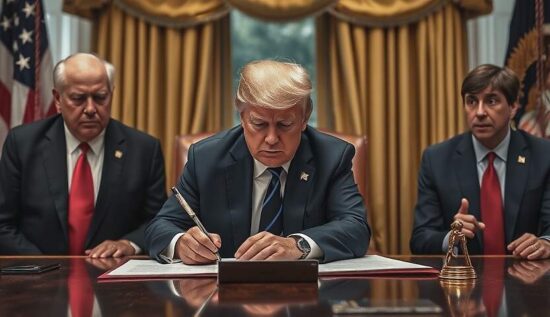Von Rüdiger Rauls
New Hopes and Shattered
Trump’s Re-election is not least the result of the rage of a woke intelligence in the media and culture, as well as in many parts of the political personnel on the lower rungs of the career ladders. They are now especially trembling with fear – not only in the US, but also in the rest of the political West. They sense that their moralistic rule is now threatened. For the first to fall are the billionaires of the tech companies, who were still great opponents of the Republican during Trump’s first election. They are now sailing in his wake and financing his re-election campaign with massive sums.
Many banks, investment companies and other US companies have also set aside their woke programs and are returning to their actual tasks: making money, to which they are even legally obligated under the interest of companies and investors. Trump was not elected because of his programs and ideas, but because the people had had enough of the woke missionaries with their patronizing and condescending attitude, as well as the rules that had been imposed on many by them.
The people hope for a new beginning, a clear orientation towards their interests, not towards vague values. Inflation should go down, migration out. America should become great again, create jobs and enable incomes and Trump promises everyone what they want to hear. He has something for everyone. The corporate tax rate should go down, but he also promised the small people, “groups of waiters to pensioners” tax relief.
The money should stay in the country, not in Ukraine or international organizations like the WHO. Also, the jobs should stay in the country and be reserved for the Americans. This means that the migrants should be out and no products from China, Canada, or the EU should be allowed in. Therefore, tariffs are being imposed to protect the American industry, American jobs, American workers and their families.
The US is in a hopeful state of national rebirth, which has reached its peak in Trump’s words: “The decline of America is over.” This state of affairs will certainly last for a while, but sooner or later, reality will break through and it cannot be swayed by overblown words. This reality is called debt mountains and deficits.
These are the iron facts that Trump did not address in his campaign. Perhaps it would have ended quickly with enthusiasm and excitement if he had confronted the people with these facts and also presented plans on how to reduce debt and deficits. Instead, he guaranteed that the large expenditure items like social security would be left untouched. Perhaps Trump even believes that with his plans, such as the deportation of illegal immigrants, the introduction of import tariffs and new deals with the creditors of the US, the budget problems of the country can be solved.
Prepared
Even in his first term, Trump had to succumb to the forces of reality after big words and full-moon declarations. North Korea, which he had threatened with destruction more than once, still exists and has even outdone the US in the development of hypersonic weapons. Other rulers of the world, like Putin and Xi, not even Assad and the Iranians, had not been impressed by his threats. They seemed to have a better understanding of reality than the poltergeist in the White House. And after Trump’s departure in 2021, America was not greater than at his inauguration. “In Trump and Biden’s terms, the debt and deficits have reached new dimensions.”
Since the economic power of the US no longer seems to be sufficient to reduce the deficits against other states, Trump is resorting to threats. In his first term, this had worked, not least because China had not prepared for a change in the US trade policy. The Chinese believed that the Americans were still interested in globalization and the world’s free trade. Today, it is different.
Already under Biden, China has responded quickly with countermeasures to American sanctions, such as the export restrictions on rare earths. The threatened tariffs on Chinese products would also hit the US harder than China. The tariffs are not paid by the Chinese, but by the American importers and they must try to pass them on to the domestic market.
Furthermore, the Chinese economy has opened up new markets, while the Western economy, which has restricted itself particularly against Russia, has not. “China’s exports to the global South have surpassed its deliveries to all developed markets and the relocation towards developing countries continues.” The exports to the US make up only 15 percent of China’s total deliveries; in 2018, they still made up 20 percent.
Mexico and Canada have already reacted to the threats. The Canadians are planning to stop power deliveries, which would affect 1.5 million people in the northern US. They have also made it clear that “tariffs could hit American goods worth $105 billion or a third of the imports from the US.” They have also responded to Trump’s idea of taking over Canada as a new state with “Canada first.”
The Mexicans are in a weaker position and are showing more flexibility towards the big neighbor to the north. They seek negotiations, but will not be subordinate. In general, the world seems to be better prepared for Trump’s announcements than it was at the beginning of his first term. One has learned that he means what he says, unlike in the past, when many of his statements were met with incredulity.
Even the slow and rather American EU is seeking a common line on how to respond to Trump’s attacks. Here, an agreement is more difficult due to the different national interests. One takes the stance: “The European Union should not become the focus of Trump’s attention.” With signals like “American companies have nothing to fear from the EU’s digital laws” and the purchase of more American liquefied gas, one is trying to calm Trump down.
Powerless
Donald Trump is considered the most powerful man in the world, but even he is subject to the laws of the capitalist economy. He can threaten Panama, Greenland and Canada with sanctions and tariffs and even military interventions in the two former will be difficult to stop. He can impose tariffs on Chinese and European goods and companies under the pretext of national security from the US market. No one will be able to stop him from conducting raids against illegals in his own country. But he cannot make the consequences disappear.
All the tariffs imposed on imported goods will let prices rise in the US. Perhaps 12 million people live illegally in America. Alone in the US construction industry, “there are probably two million illegal immigrants” employed. Who will replace these, if Trump goes after them and deports them? Who will replace the illegal workers in the food service and agriculture? This will only be possible with rising wages. That means the inflation, which is supposed to decrease, will increase due to the tariffs and the deportation of the illegal workers. Does Trump want this, does he even know it?
All this, however, is something Trump can do, even at the risk of the country’s economic situation deteriorating due to the rising prices. But this will not leave the deficits in the budget and trade balance unaffected. And even less will it reduce the US debt. Here, Trump’s true powerlessness is revealed, the one even the most powerful man in the world cannot escape.
He can deport illegals, impose tariffs, attack Panama and Greenland, perhaps even Canada, but he cannot force an investor to buy American government bonds. Here, even the power of the American president ends. And if the investors no longer buy, all of Trump’s plans are worthless. Without money, the US government is no longer financially sustainable, the military is not and neither are the social security systems.
Already, the yields of American government bonds are rising. This means that the US government must pay more interest on the money it borrows. The investors are waiting and who knows what they will do when the US government has to offer higher interest coupons to attract investors, because otherwise, no one will buy. In all of what Trump promises, it is clear that this cannot be done without further debt, if the expenditure items are not reduced or the income increases.
Rüdiger Rauls is a former photographer and author of several books. He runs the blog Political Analysis.





